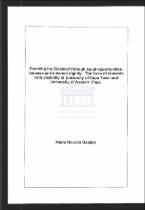| dc.contributor.advisor | Esau, Michelle | |
| dc.contributor.author | Baatjes, Mario Ricardo | |
| dc.date.accessioned | 2022-09-08T08:38:42Z | |
| dc.date.available | 2022-09-08T08:38:42Z | |
| dc.date.issued | 2003 | |
| dc.identifier.uri | http://hdl.handle.net/11394/9300 | |
| dc.description | Masters in Public Administration - MPA | en_US |
| dc.description.abstract | The Constitutional right to equality is one of the key pillars of our democratic society in South Africa. This might also be regarded on one of the contradictions of the new dispensation as many people, and especially people with disabilities, still have to bear the brunt of an unequal society. The University of Cape Town and the University of the Western Cape are studied in this mini-thesis to ascertain how effectively they have integrated people with disabilities in the institutions of higher Iearning. By reviewing these two institutions, it is anticipated that interesting insights will be revealed, especially given the fact that the UCT is regarded as a previously advantaged institution and the UWC is regarded as a previously disadvantaged institution. What is of extreme importance is what these two institutions can learn from each other in terms of the progress made so far. The Constitution, the White Paper on an lntegrated Disability Strategy and other pieces of legislation was drafted to overcome the inequalities, which existed in the past. This study thus attempts to determine what constitutes equality and whether people with disabilities are currently being treated equally, fairly and with dignity. Both institutions have disability units that are required to ensure that students with disability are assisted and that issues pertaining to the disabled are highlighted and addressed. Despite these attempts, however, the universities still experience problems around the full integration of students with disabilities into the institutions. Most buildings at the universities do not allow for the free and unhindered movement of students in wheelchairs. Both the
physically challenged and the visually challenged are constantly reminded of their disability, as they continuously need to be assisted by other people Accordingly this study aims to assess the current situation around people with disabilities and makes recommendations towards improving the overall service delivery that they receive. ln order to determine the equality of service towards disabled people, a
comparative study was conducted of the University of Cape Town and the University of the Western Cape. The conclusions drawn were that although the provisions of equality has been partly successful, there are however still numerous shortcomings in this regard. ln conclusion, recommendations are made to address some of the prevailing problems in respect of the equal opportunities of disabled people. | en_US |
| dc.language.iso | en | en_US |
| dc.publisher | University of the Western Cape | en_US |
| dc.subject | Constitutional | en_US |
| dc.subject | Department of Labour (DOL) | en_US |
| dc.subject | Text Conversion and Assertive Technology Service (TCATS) | en_US |
| dc.subject | The office on the status of disabled persons (OSDP) | en_US |
| dc.subject | Employment Equity Act (EEA) | en_US |
| dc.subject | Skills Development Act (SDA) | en_US |
| dc.subject | Sector Education and Training Authorities (SETA's) | en_US |
| dc.subject | Government | en_US |
| dc.title | Equality for disabled people with special reference to the University of the Western Cape and the University of Cape Town | en_US |
| dc.rights.holder | University of the Western Cape | en_US |

